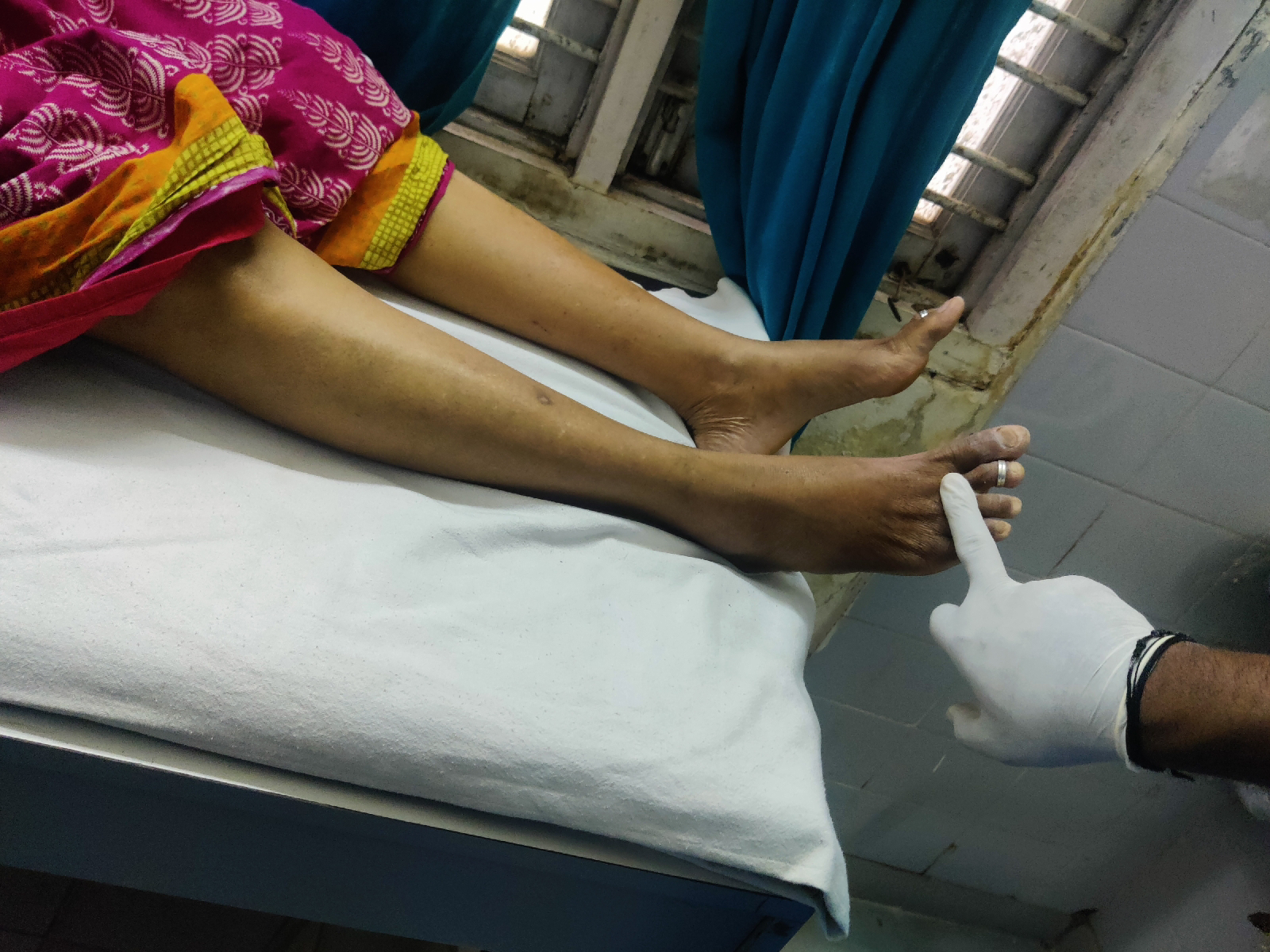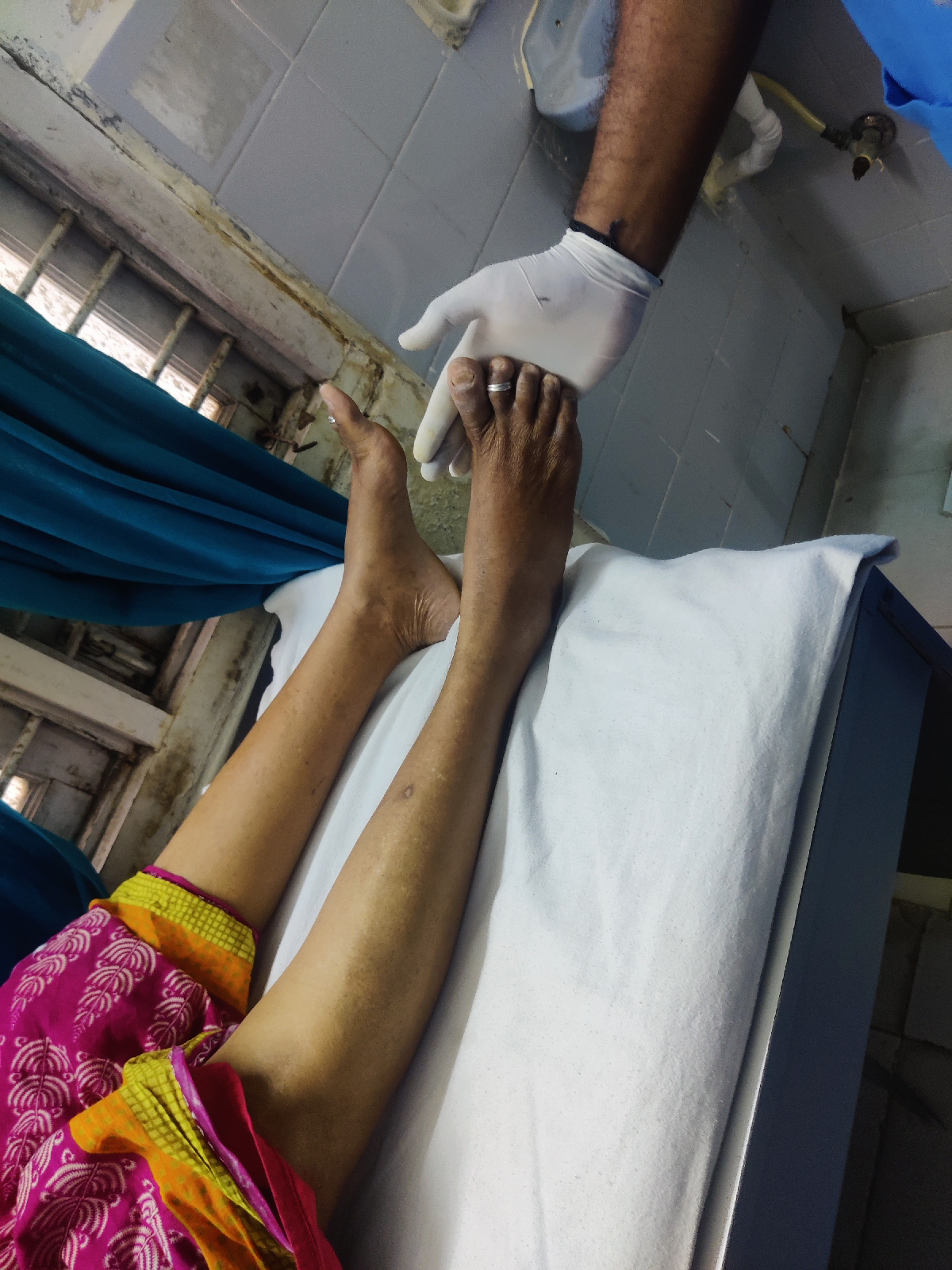60 /Female with slowness of movement/ Long case
This is an online E log book to discuss our patient's de-identified health data shared after taking his/her/guardian's signed informed consent.
Here we discuss our individual patient's problems through series of inputs from available global online community of experts with an aim to solve those patient's clinical problems with collective current best evidence based inputs.
This E log book also reflects my patient-centered online learning portfolio and your valuable inputs on the comment box is welcome."
Chief compliants:
1) Slowness of movements since 1 year .
2) Involuntary movements of the Left upper limb.
3) Slowness in speech since 1 year.
History of present illness:
60 year old female,who is a mother of 3 children ( 1 son and 2 daughters ), labour by occupation ( goes to agriculture field ) was apparently asymptomatic 1 year back, then developed Slowness of movements which was insidious onset, gradually progressive not associated with any weakness associated with difficulty in initiation of movement and difficulty in day to day activities .The difficulty was in such a way that she could not even comb the hair, mix the food and bathing.
History Involuntary movements of the left upper limb since 1 year , occuring at rest ,aggravated by emotional stress and disappeared during sleep and movement.
History of associated postural changes .
No History of sensory disturbances
No History of anosmia.
History of sleep disturbances- present
No History of Genito urinary and Gastro intestinal disturbances.
No History of Dysphagia
No History of fever , convulsions and coma
No History of head injury
No History of yellowish discoloration of eyes
No History of usage of any antipsychotic drugs.
Family History:
No Significant family History
Personal history:
Mixed diet
Normal bowel and bladder
Sleep:
Past history:
No history of similar complaints in the past .
No history of Diabetes, Hypertension, Cerebrovascular disease, Cardiovascular disease .
General Examination:
Patient is conscious and Co operative.
Facies :
Infrequent blink with Starring look.
Loss of facial expression.
No pallor, icterus, Cyanosis, clubbing,lymphadenopathy, edema
Pulse :
BP: supine - 110/70mmhg
PR: 80bpm
Standing - 100/70 mmhg.
PR: 90 bpm
Posture : stopped posture.
Neurological examination:
1. HIGHER MENTAL FUNCTIONS:
a. Consciousness- Normal
b. Orientation to time, place and person- present.
c. Speech and language -slow speech.
d. Memory -Normal
e. Delusions, hallucinations- No
f. Emotional lability
g. MMSE score
I. Orientation
1.date, day, mönth, season, year -4
2. floor, hospital. District, state, country- (5)
II. Registration
Name three objects taking one second for each obiect. Ask him to repeat the same
Repeat till he remembers (3)
III. Attention and Calculation
Serial 7's 5 times - 4 points.
IV. Recall
Recall the three objects (3)
V. Language
I. Name 2 obiects (2)
2. Repeat a sentence (1)
3. Follow a 3 stage command (3)
4. Reading "close your eyes"- Not done.
5. Writing a sentence - Cannot write.
6. Copy a design (1)
TOTAL SCORE- 26/30
2] CRANIAL NERVES.
I) Sense of smell - Normal on both sides.
II) On Right side - No perception of light
On left side - Visual acuity, colour vision - Normal.
III,IV,VI)
i) Extra-ocular movements - Normal in both eyes .
ii) Pupil - Size - 2-3 mm in both eyes.
ili) Direct Light Reflex - Sluggish in right eye
Constriction of pupil- left eye.
iv) Consensual Light Reflex- Absent in left eye.
v) Accommodation Reflex - Absent in right eye,
vi) Ptosis - absent vil) Nystagmus - absent
V)
i) Sensory -over face and buccal mucosa -presen
il) Motor - masseter, temporalis, pterygoids- normal
iii) Reflex a.Corneal Reflex - present in both eyes.
b. Conjunctival Reflex - present in both eyes. C.Jaw jerk - absent VII)
i) Motor - intact on both sides il) Sensory -
Taste of anterior 2/3rds of
tongue- present.
Sensation over tragus
iii) Reflex -
Corneal- present Conjunctival- present.
8)
i) Rinnes Test - AC more than BC ii) Webers Test- unable to perceive the vibrations when tuning fork - kept on fore head.
IX,X)
i) Uvula, Palatal arches, and movements- Normal
¡¡)Gag reflex - Present
iii) Palatal reflex- Present
XI)
i) trapezius- able to perform . ¡¡)sternocleidomastoid -slight difficulty in turning
XII)
¡)Tone-Normal
¡¡)wasting- No
iii) Fibrillation-No iv) Movements - normal.
3] Motor system
I- BULK
a. Inspection - Normal
b. Palpation - Normal
c. Measurements
Upper limb- MAC -30 cm on both sides.
Lower limb-MLC - 31cm on both sides
II - TONE
a.Upper limbs- Fluctuant rigidity in upper limbs - Cog wheeling type .
b. Lower limbs- rigidity experienced throughout movement - Lead pipe type.
III - POWER
a. Neck muscles- 5/5
b. Upper limbs
i)Shoulder
Flexion-Extension-5/5
Lateral Rotation-Medial Rotation-5/5
Abduction -Adduction-5/5
ii)Elbow
Flexion-Extension-5/5
iii)Wrist
Dorsi flexion-Palmar flexion-5/5
Abduction-Adduction-5/5
Pronation-Supination-5/5
iv)small muscles of hand-5/5
V)Hand grip- Normal.
с.Lower limbs
i)Hip
Flexion-Extension-5/5
Abduction-Adduction-5/5
Lateral Rotation-Medial Rotation-5/5
ii)Knee
Flexion-Extension-5/5
iii)Ankle-
Dorsi flexion-Plantar flexion-5/5
Inversion-Eversion-5/5
IV -REFLEXES
A. SUPERFICIAL REFLEXES( Both sides )
1. Corneal- Present
2. Conjunctival- Present.
4. Palatal Reflex-present
5. Abdominal Reflex-present
5. Plantar Reflex- Negative.
B. DEEP TENDON REFLEXES( Both sides )
1. Jaw jerk- Absent
4. Biceps jerk- +2
5. Triceps jerk-+2
6. Supinator jerk-+2
7. Finger flexion reflex- no response.
8. Knee jerk-+2
9. Ankle jerk-+2
10. Clonus- Absent
VI GAIT- Video
VIl - INVOLUNTARY MOVEMENTS- Absent
A - Athetosis, Asterexis
B- Ballismus
C - Chorea
D- Dystonia
E - Essential tremors
F -Fasciculations
M - Myoclonus
4]SENSORY SYSTEM
TEST
I - SPINOTHALAMIC( Both sides )
1. Crude touch- Normal
2. Pain- Normal
3. Temperature- Normal
II - POSTERIOR COLUMN
1. Fine touch- Normal
2. Vibration- Normal
3. Proprioception - Normal
4. Romberg's sign- negative
III - CORTICAL( both sides )
1. Tactile localisation- present
2. Graphaesthesia- Present
3. Stereognosis- present
5]CEREBELLAR SIGNS
Coordination( on both sides )
a. Upper Limbs - Finger Nose test, Finger Finger Nose test, Drawing a circle,
Putting a dot in the centre of the circle ~ Present
b. Lower Limbs - Heel Knee test
c. Dysdiadokokinesia- Absent
6. AUTONOMIC NERVOUS SYSTEM
Postural Hypotension
Resting tachycardia
Abnormal sweating
7. SIGNS OF MENINGEAL IRRITATION
Neck stiffiness- Absent
Kemig's sign-Absent
Brudzinski's sign-Absent
Examination of other systems:
CARDIOVASCULAR SYSTEM:
JVP- Not raised ,Apex normally placed, no Palpable P2, Heart sounds - normal, No thrills/murmurs
RESPIRATORY SYSTEM:
Chest symmetrical, No paradoxical movements, Normal vesicular breath sounds heard,
No abnormal/added sound
ABDOMEN:
Abdomen is soft, No organomegaly, No ascites.
Test for extensor digitorum brevis
Tibialais posterior.
Ilio psoas
Interossei muscle testing
Adductor pollicis
Testing for pain:
DIAGNOSIS
INVESTIGATIONS:
RBS- 91mg/dl
Blood urea- 28mg/dl
Serum creatinine - 0.7mg/dl
CUE
Colour: pale yellow
Appearance: Clear
Albumin NIL
Sugar NIL
Bile salts and pigments NIL
Pus cells: 2-3
Epithelial cells: 2-3
RBC NIL
Crystals, casts NIL
Amorphous deposits NIL
HEMOGRAM
HB: 13.2
TLC: 7700
N/L/E/M: 53/33/4/10
PCV: 40.3
MCV: 82.3
MCB: 27.1
MCHC: 32.8
RBC: 4.87
PLT: 3.5
LFT
TB: 1
DB: 0.2
AST: 17
ALT: 9
ALP: 148
TP: 7.4
ALBUMIN: 4.0
A/G: 1.2
HIV- negative
HBsAg- negative
HCV- negative
ECG:
CXR- PA
TREATMENT:
1) Tab Syndopa ( levodopa 100mg+ Carbudopa 25 mg) PO/OD.












Comments
Post a Comment